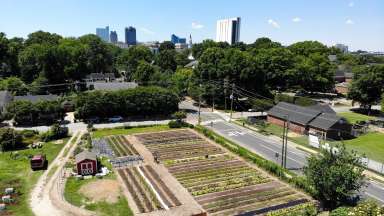Urban agriculture is an umbrella term that describes a range of food-growing practices, from backyard gardens and community gardens, to sometimes larger and more intensive urban farms. Urban farms may comprise commercial enterprises (also called “market gardens” or nonprofit endeavors that grow produce on a more intensive scale for sale or distribution.
Urban agriculture encompasses a host of benefits for cities, including increased access to healthy, locally grown food sources, preserving green spaces that help absorb rainfall and reduce the heat island effect, and providing community connections that bring people closer to nature and the soil.
